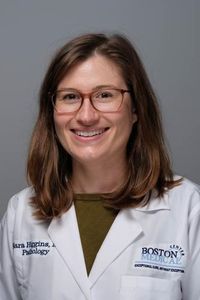Residency Program Leadership

Sara Higgins, MD |

Reggie Thomasson, MD |

Daphney Noel |
Program Mission
The Pathology and Laboratory Medicine Residency Program prepares physicians for practice and leadership in both academic and community-care pathology. Jointly facilitated through Boston Medical Center and Boston University Chobanian & Avedisian School of Medicine, this program advances the century-plus long heritage of the former Boston City Hospital’s Mallory Institute of Pathology by continuing to excel in research, training, and innovation. With the institutions’ goal of remaining at the forefront of medical practice and education, the mission of the program is to produce researchers, scholars, and practitioners who shape and shift the landscape of 21st century medicine.
Driven by this mission, the residency program is a dynamic learning experience. In addition to being a welcoming and diverse healthcare community of mentors, faculty, and staff , the program also fosters an environment for rigorous pedagogy. Over the course of the program, residents learn from challenging case material, care for a diverse patient population, earn progressive responsibility, and explore abundant and varied opportunities in clinical and basic science research. Through this relevant and comprehensive approach, the program strengthens its residents’ commitment to the ideal of providing exceptional medical care for all.
Program Aims
- Instill our residents with the diagnostic knowledge, skill, and confidence necessary to become leaders in the field of Anatomic and Clinical Pathology in both community and academic practice.
- Ensure resident trainees become thoroughly and comprehensively proficient in the six core competency areas: patient care, medical knowledge, practice-based learning and improvement, interpersonal and communication skills, professionalism, and system-based practice.
- Promote leadership skills, professional responsibility, patient safety, effective communication, service to the community, and excellence in patient care.
- Cultivate research, teaching, mentoring, and scholarly activities relevant to the medical care of our patients and the educational needs of our trainees.
- Foster a collegial environment that supports resident education, equity, diversity, and inclusion, personal well-being, cross-cultural harmony and friendship among residents, faculty and staff.
- Provide exceptional medical care for all. BMC is the largest safety net hospital in New England and cares for many underserved populations, including low income and elderly groups who rely on public assistance for health care. For this reason, the program provides an unique opportunity to learn about, promote and advance health equity.
- Ensure that all members of the healthcare team are treated fairly and have ample opportunity to communicate any concerns, including errors and near misses, within a learning environment in which all can express concerns without fear of retaliation.